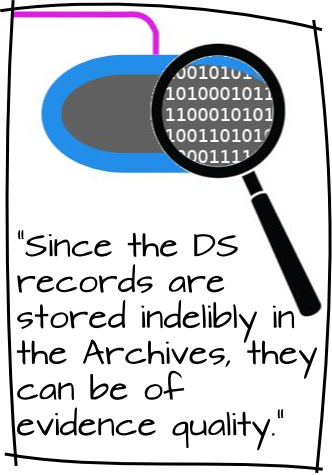"I need certainty in IT project costs. We cannot have these constant overruns in cost and time."
We capture all the data that is "of interest", in DSI records. Then we support the analysis of this data in ways that are useful - now or in the future. We never close doors, we leave all options open.
"We need effective Business Intelligence from our systems. Our past investments in MRP systems have failed to deliver the benefits promised."
DSI records capture every event that is of interest. These records can be analyzed in every way imaginable, at any time. So your BI goals can always be met. When the data is captured, nothing about its analysis is presumed. No doors are ever closed.
"Disaster Recovery is hugely important to us, but we don't have a good way to do it. Nobody is confident that our plan will work when needed."
DR is a design requirement of every LB. It is simple to requisition the necessary history from the Librarian and re-build each Data Base (DB) in every LB. So DR is easy to test and verify. It's not a big deal for us.

"Security is hugely important, but we don't have good ways to ensure it."
In the DSI space we can lock down every TCP/IP stack so it responds only to DSI records that arrive at a socket pair. This prevents unwanted access. Supervisors can watch every DSI message, looking for unusual traffic. The most secure systems are immune from insider exploits.
"Our systems cannot cope with the Internet of Everything."
DSI is IoE. DSI records are “of interest” without regard to the eventual uses that may be made of them.
"We have Legacy systems that are hard to maintain and impossible to re-engineer."
You can re-engineer a Legacy System by tracking its inputs and outputs with a DSI system. When the outputs always concur, then you can retire the Legacy.
"What is new about your paradigm?"
Nothing. It's all old, from the early days of computing. Except that today we have copious and very affordable resources available to use.
"IT systems are a major competitive driver for our business. But they are too costly."
Development of a DSI system can be very economical, and fast. And flexible.
"IT projects sometimes fail to deliver, or are canceled. How does your system differ in this risk?"
The DSI project will proceed methodically. DSI records are defined to capture all that is of interest. Then the LBs are defined and specified, and built to order. Then tested and installed. There is steady progress, and constant Deliverables. What's to fail?

"We need a method to document production processes for liability protection. Can DSI help?"
Yes. Since the DSI records are stored indelibly in the Archives, they can be of evidence quality.
"My company sends invoices for electric energy and sometimes the amount charged is outlandish. I need a "sanity check" that is independent from all other systems, to check and approve each invoice before it is printed and mailed."
In DSI there would be a DSI record published for each invoice. Today the subscriber would be the printing department. But you could easily place a sanity check LB into this sequence. This new LB would have access to all the DSI records in the Archive, so it could certainly check that this invoice is reasonable. If not, then it would not be published to the printing department, but instead a new DSI record would be published for the CIO's attention. Then a team would swing into action to track down the cause of the insanity.
"We need to be compliant with the new CASL law. Can DSI help us with our marketing communication challenges?"
DSI would be a good way to manage your marketing emails. Each subscriber would be described by a DSI record. Each Unsubscribe would be a DSI record. So it would be easy to check each address before sending. Each email would be described by a DSI record, showing the intent, category, stage of interest, etc. This could be built into a super contact management tool.
